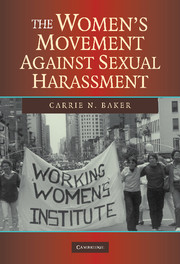Book contents
- Frontmatter
- Contents
- Figures
- Acknowledgments
- Organizational Abbreviations
- Introduction: Enter at Your Own Risk
- PART I RAISING THE ISSUE OF SEXUAL HARASSMENT
- 1 Articulating the Wrong: Resistance to Sexual Harassment in the Early 1970s
- 2 Speaking Out: Collective Action against Sexual Harassment in the Mid-1970s
- 3 A Winning Strategy: Early Legal Victories against Sexual Harassment
- PART II GROWTH OF A MOVEMENT AGAINST SEXUAL HARASSMENT
- PART III THE MOVEMENT'S INFLUENCE ON PUBLIC POLICY
- Conclusion: Entering the Mainstream
- Appendix A Time Lines of Significant Events
- Appendix B Glossary of Select Cases
- Notes
- Bibliography
- Index
3 - A Winning Strategy: Early Legal Victories against Sexual Harassment
from PART I - RAISING THE ISSUE OF SEXUAL HARASSMENT
Published online by Cambridge University Press: 14 June 2019
- Frontmatter
- Contents
- Figures
- Acknowledgments
- Organizational Abbreviations
- Introduction: Enter at Your Own Risk
- PART I RAISING THE ISSUE OF SEXUAL HARASSMENT
- 1 Articulating the Wrong: Resistance to Sexual Harassment in the Early 1970s
- 2 Speaking Out: Collective Action against Sexual Harassment in the Mid-1970s
- 3 A Winning Strategy: Early Legal Victories against Sexual Harassment
- PART II GROWTH OF A MOVEMENT AGAINST SEXUAL HARASSMENT
- PART III THE MOVEMENT'S INFLUENCE ON PUBLIC POLICY
- Conclusion: Entering the Mainstream
- Appendix A Time Lines of Significant Events
- Appendix B Glossary of Select Cases
- Notes
- Bibliography
- Index
Summary
By the late 1970s, when federal circuit courts were hearing the appeals of the early cases denying sexual harassment claims, the climate was right for a change in court opinion. By then, feminists had succeeded in raising awareness of sexual harassment, developing stronger networks, and generating influential research and analysis of the issue, all of which contributed significantly to convincing courts that sexual harassment was a serious violation of women's civil rights. Feminists’ efforts, growing media coverage of the issue, and the more progressive makeup of the appellate courts ultimately led to victory for each of the plaintiffs of the early sexual harassment cases. In overturning every case that denied relief and ruling in favor of the sexually harassed women, appellate courts agreed that Title VII prohibited quid pro quo sexual harassment, where a supervisor fires a subordinate employee for refusing to comply with sexual advances. In addition to the workplace cases, a district court ruled for the first time in Alexander v. Yale that federal law prohibited quid pro quo sexual harassment at educational institutions. These landmark rulings resulted from the joint efforts of individual women filing suits and the collective activism against sexual harassment.
Feminist attorneys and activists had developed a network that could now support the women appealing their cases. The plaintiffs turned to feminist attorneys to represent them on appeal. In Barnes v. Train, Linda Singer, a feminist lawyer well connected with other feminist attorneys, represented Paulette Barnes on appeal before the D.C. Circuit. Singer, a 1968 graduate of George Washington University Law School, practiced civil rights law with the firm of Kurzman and Goldfarb in Washington, D.C., where she became a partner in 1972. In the early 1970s, she volunteered at the Women's Legal Defense Fund (WLDF), which referred the Barnes case to her. In Miller v. Bank of America, Mary Dunlap, a 1971 graduate of the University of California's Boalt Law School in Berkeley, represented Margaret Miller on appeal. Dunlap was co-founder of Equal Rights Advocates (ERA) in San Francisco, a public interest law firm engaged in litigation and education to further equal rights for women.
- Type
- Chapter
- Information
- The Women's Movement against Sexual Harassment , pp. 49 - 64Publisher: Cambridge University PressPrint publication year: 2007



